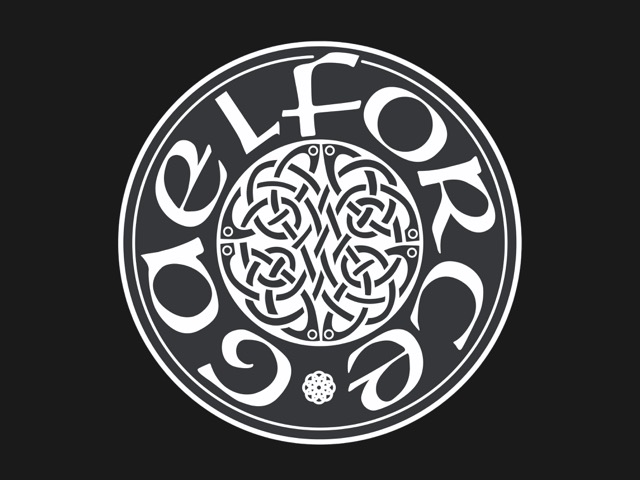A History of The Band
Gaelforce originated as an idea in the late 1980s, evolving from a popular Yorkshire folk rock band known as Cocky—a name reflecting the region’s term for confidence. Several members of Cocky sought a rockier sound, leading to the formation of Gaelforce, with Chris Dyson on fiddle and mandola, Karen Exley on vocals, David Collins on keyboards, and Roy Whyke on drums. The group was soon joined by bassist and multi-instrumentalist Hugh Bradley from Huddersfield and Barnsley rock guitarist Pete Moreton.
The band also played a number of support concerts for major names, including Lindisfarne and Capercaillie. Their album Stoirm was released on CD in 1994.
In 1997, the band fell apart, as bands sometimes do, which was a real shame as Gaelforce had a growing reputation and a promising future ahead of them.
During the band’s hiatus, Chris became more involved in traditional Irish music, spending part of a decade living part-time in County Mayo, Ireland, and becoming involved with Leeds Comhaltas. After playing in several bands, Chris considered reforming Gaelforce. A chance meeting with former bass player Gary Wells led to the decision to bring the band back.
This marked the beginning of the current iteration of Gaelforce when Chris teamed up with talented rock guitarist Geoff Taylor. Chris and Geoff had seen each other perform before, as Geoff had played for many years with the excellent Leeds-based Duncan McFarland Band. Both had also been regular artists at the Otley Folk Festival during the 1990s, so they were aware of each other’s work. Their collaboration clicked, and the result was their first track together, Back Home in Derry.
Gary Wells, who had rejoined the band as bassist, left shortly after Gaelforce re-formed. In his place, Chris brought in Eddie Green, a former bassist for Oscar the Frog and an old friend. They also discovered drummer Matt Kirton, who had recently moved to Yorkshire from London, where he had played drums in Shane McGowan’s band.
As the new lineup began performing a few pub gigs, the COVID-19 pandemic struck, putting a halt to many aspects of life. Despite this, Chris and guitarist Geoff Taylor continued working remotely. It was during this period that the majority of the album Equinox emerged. Geoff recorded from his home studio, while Chris learned to home-record, adding vocals and fiddle lines to the tracks.
During the pandemic, Chris also composed a significant number of tunes, many of which were recorded and shared on YouTube. These recordings featured Chris on fiddle and bouzouki, all composed, performed, and recorded from home. Here is one of several examples.
At the end of the COVID period, Eddie Green decided to leave Gaelforce and joined the John Palmer Band, while Matt Kirton also departed due to work and family commitments. To fill the vacancy on bass, the band brought in Sam Dowgill, who already played alongside Geoff in the rock band GTO and fit in seamlessly. With Irish roots in his family, it almost seemed like destiny for Sam to join Gaelforce.
The search for a new drummer led them to Jim Brierley, who had recently returned to Yorkshire after spending the past few decades living in Normandy.
This solidified the current core of the band, with Chris Dyson on fiddle and vocals, Geoff Taylor on guitars, Sam Dowgill on bass, and Jim Brierley on drums.
Gaelforce played small pub gigs and a few folk clubs, but the game changer came in January 2023, when they were selected to perform on the Introducing Stage at the Great British Folk Festival in Skegness. The Introducing Stage was effectively a competition, with the winner determined by audience vote. It was a close call even to get started, as each act had only 15 minutes to set up, plug into the PA, and begin playing. For a band as complex as Gaelforce, this was a tall order. With mere seconds to spare, they burst into their opening number without having had any soundcheck.
The audience responded enthusiastically, and Gaelforce won the public vote by a significant majority in front of over 2,000 people. This surreal moment led to festival director Stephen Stanley inviting the band to fill a main stage slot the next day, after another act had dropped out. With a full soundcheck this time, Gaelforce performed to over 2,000 people on the main stage of the festival.
This was a turning point for the band, as they were immediately booked by numerous folk venues, including becoming the first-ever guest artist at the Wetherby Folk Club, where they played a sell-out gig. Gaelforce quickly transitioned from pub gigs to ticketed concerts at small theatres and arts centers, selling out venues across Yorkshire and beyond.
In mid-2023, Chris was approached by an old friend, Craig McIntosh, about the possibility of incorporating Highland bagpipes into Gaelforce’s sound. Playing with bagpipes presented a challenge and a steep learning curve, as they are unlike most conventional instruments in a folk rock band. However, the technical issues were gradually overcome, and the pipes proved to be a hit with audiences, adding a unique dimension to Gaelforce’s performances.
Recently, Craig McIntosh stepped down from Gaelforce due to his many other commitments, including serving as Pipe Major for the Los Angeles Pipe Band in the USA. The band has since brought in Ed Arnold, a well-known piper from Sheffield, whose Scottish roots trace back to his family from Aberdeen.
At the time of writing, Gaelforce is in the final stages of releasing a new album, Solstice, on which both Ed and Craig are featured playing the pipes. Additionally, Chris’s old friend Brian Aylward from Leeds Comhaltas has joined as an extended band member, playing Uilleann pipes and flute for occasional gigs when their regular piper is unavailable.
So, watch this space!
